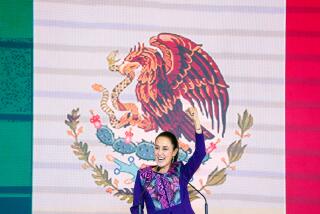Sandinista Women Making Gains Against Macho Attitude in Nicaragua
- Share via
MANAGUA — Nicaraguan women, many of whom fought on the battlefield to help bring about the Sandinista revolution, are back in combat demanding that the new society change its macho attitude toward females.
In the last year, a growing women’s movement has obtained equal rights in divorce and had a satirical newspaper suspended for presenting women as sexual objects.
It’s not a battle won easily in Latin America, where women are expected to remain subservient to males, stay at home and rear children. This, despite the fact that many women must work outside the home to survive.
Women’s lives are further burdened by primitive conditions: shanty homes, lack of potable water or plumbing, wood-burning stoves.
These day-to-day struggles, coupled with the lack of education and sexist attitudes, make the job of the women’s movement more difficult. When asked about women’s rights, a peasant woman in the rural south asked, “What is that?”
“We are trying to change the level of consciousness,” said Lea Guido, head of the Luisa Amanda Espinoza Assn. of Nicaraguan Women.
Guido’s group is linked to the ruling Sandinista National Liberation Front and takes its name from one of the martyrs in the fight to depose Anastasio Somoza, who was ousted in 1979.
“Participation by women in politics is a new phenomenon,” she said. “It started because everyone was against the dictator, and that caused everyone to fight. It was the first victory for women.”
During the war, women served as guerrilla fighters or messengers and ran safe houses, organized demonstrations, set up contacts and sought the release of prisoners.
Dora Maria Tellez was a guerrilla commander. She is now the minister of health. Doris Maria Tijerino was a clandestine member of the Sandinista Front. She is now the nation’s chief of police.
Rosario Murillo, the nation’s first lady, worked secretly with the guerrillas. Rosa Pasos, a lieutenant colonel in the army and spokeswoman for the Defense Ministry, acted as a go-between in clandestine contacts.
Many women, especially in the capital, wear olive green uniforms for their administrative jobs with the army and Interior Ministry. The government even provides maternity uniforms.
Thousands of civilian women underwent arms training for militia work, some in the use of Soviet-made anti-aircraft guns. They are barred from combat but serve behind the lines as cooks and in administrative jobs.
“Women here traditionally were not just housewives. They always worked,” Guido said. “But they used to be exploited by the men and not paid fairly.”
Most women work to add to the family income, and just finding scarce goods and budgeting with 20,000% inflation can be a full-time job.
The official Sandinista newspaper Barricada said 70% of the pickers for coffee, the nation’s main export crop, are women. Almost 49% of the state’s administrative positions are held by women, but none is among the nine-member directorate that runs the Sandinista Front.
“We’re working on it,” Guido said. “In a country so poor, so backward, it’s not easy, but there’s a political will.”
The Sandinista party has vowed to “abolish the discrimination that women have suffered with respect to men; it will establish economic, political and cultural equality between women and men.”
But old ideas are hard to change.
“A woman’s job is to take care of the family. What is this about rights? They have rights,” said a man at a vegetable market. Several other men agreed.
“Having women in battle creates problems, jealousy, you know what I mean,” a young male army lieutenant said.
Guido’s organization opened a legal affairs office in 1983 to deal with abuses, separations, and much-needed sex education.
“The legal office has had to overcome women’s traditional timidity and fear in publicly discussing problems that have long been considered exclusively private and better left unexamined,” said Envio, a magazine published by the Central American Institute, a Sandinista think tank.
Guido points out that education is an important part of the movement.
“Many women in the rural regions are not married. They have too many children, it’s part of the machismo,” she said.
“Before the triumph, we didn’t even have day care,” Guido said. “It’s still insufficient, but it’s enormous in comparison.”
More to Read
Sign up for Essential California
The most important California stories and recommendations in your inbox every morning.
You may occasionally receive promotional content from the Los Angeles Times.












